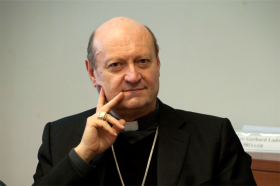 Do emotions shape the world? Science-theology conference, Assisi, 2 May 2014
Do emotions shape the world? Science-theology conference, Assisi, 2 May 2014
Towards a Biblical Theology on Emotions
Keynote address by Card. GIANFRANCO RAVASI
“Like the one who has set out to sea in a small boat is filled with immense anxiety, as he is entrusting a small piece of wood to the immensity of the waves, so also we are apprehensive as we venture into such a vast ocean of mysteries.” (In Genesim Homiliae IX, PG 12, 210). A tension similar to the one expressed by Origen on the threshold of undertaking a homiletic commentary on the Book of Genesis is experienced by the one who wishes to even attempt a sketch of the biblical theology of emotions. Two reasons stir up this fear. On the one hand, there is an enormous fluidity regarding the definition and classification of emotions: In a study published in 1981, two researchers at the Georgia Southern College listed no fewer than 92 definitions in which they pooled together 9 skeptical statements about the possibility of defining such a variable reality, engaged in the Bible - as we shall see – by a lexically and symbolically complex and varied constellation.
On the other hand, this human process with many components comes into sight in the entire arcade of the Biblical pages with an impressive wealth and one would not be able to compress it into a rigorous theoretical mold: beginning with aesthetic emotion itself of the Creator contemplating the beauty/goodness (tôb) of his work in chapter 1 of Genesis, right upto the tension that rules supreme on the last page of the Book of Revelations in which there is a yearning for the coming of Lord Jesus (22:17,20). Between these two extremes, sprawls a real album of emotions difficult to be catalogued. It is a chromatic emotional spectrum that goes from the frigid violet of anxiety or fear, and comes into the warm red of joy or tenderness. Therefore we would need to proceed only through selective surveys or emblems (for example, the Psalter in itself could transform into a vocabulary of the whole human emotional arch).



